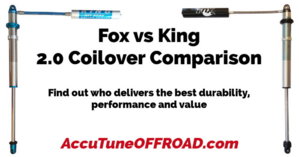TRD
Active Member
- Joined
- Aug 24, 2015
- Location
- Hermosa Beach
I've written an article comparing Fox and King 2.0 Remote Reservoir Coilovers to help you choose between the two. I frequently hear people saying "do you prefer blue or black", but that's not really the whole story. To write the article the shocks were dyno tested, disassembled, and compared for performance, durability and value.
Check out the full King vs Fox 2.0 Coilover Shock Comparison Article.
I have been tuning and engineering shocks since 2001 and prior to starting AccuTune Off-Road I was the chief engineer at a shock manufacturing company. I have tons of experience connecting lab data with real world performance at have invented patented shock technology used in premium shocks.
The article hits the highlights between the two shocks, and I'd be happy to dive into the details here, let's talk shocks!
Check out the full King vs Fox 2.0 Coilover Shock Comparison Article.
I have been tuning and engineering shocks since 2001 and prior to starting AccuTune Off-Road I was the chief engineer at a shock manufacturing company. I have tons of experience connecting lab data with real world performance at have invented patented shock technology used in premium shocks.
The article hits the highlights between the two shocks, and I'd be happy to dive into the details here, let's talk shocks!



